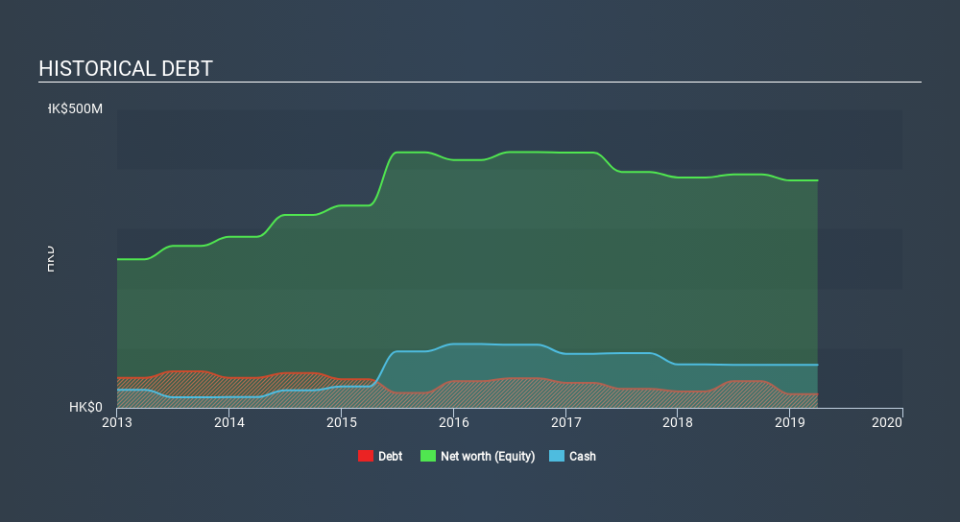These 4 Measures Indicate That Infinity Development Holdings (HKG:640) Is Using Debt Safely

Some say volatility, rather than debt, is the best way to think about risk as an investor, but Warren Buffett famously said that 'Volatility is far from synonymous with risk. So it might be obvious that you need to consider debt, when you think about how risky any given stock is, because too much debt can sink a company. We can see that Infinity Development Holdings Company Limited (HKG:640) does use debt in its business. But should shareholders be worried about its use of debt?
Why Does Debt Bring Risk?
Debt and other liabilities become risky for a business when it cannot easily fulfill those obligations, either with free cash flow or by raising capital at an attractive price. Part and parcel of capitalism is the process of 'creative destruction' where failed businesses are mercilessly liquidated by their bankers. However, a more usual (but still expensive) situation is where a company must dilute shareholders at a cheap share price simply to get debt under control. Of course, the upside of debt is that it often represents cheap capital, especially when it replaces dilution in a company with the ability to reinvest at high rates of return. When we think about a company's use of debt, we first look at cash and debt together.
See our latest analysis for Infinity Development Holdings
What Is Infinity Development Holdings's Net Debt?
As you can see below, Infinity Development Holdings had HK$22.8m of debt at March 2019, down from HK$27.5m a year prior. However, its balance sheet shows it holds HK$71.9m in cash, so it actually has HK$49.1m net cash.
A Look At Infinity Development Holdings's Liabilities
According to the last reported balance sheet, Infinity Development Holdings had liabilities of HK$133.3m due within 12 months, and liabilities of HK$13.2m due beyond 12 months. Offsetting these obligations, it had cash of HK$71.9m as well as receivables valued at HK$151.7m due within 12 months. So it actually has HK$77.1m more liquid assets than total liabilities.
It's good to see that Infinity Development Holdings has plenty of liquidity on its balance sheet, suggesting conservative management of liabilities. Because it has plenty of assets, it is unlikely to have trouble with its lenders. Simply put, the fact that Infinity Development Holdings has more cash than debt is arguably a good indication that it can manage its debt safely.
In addition to that, we're happy to report that Infinity Development Holdings has boosted its EBIT by 87%, thus reducing the spectre of future debt repayments. When analysing debt levels, the balance sheet is the obvious place to start. But you can't view debt in total isolation; since Infinity Development Holdings will need earnings to service that debt. So if you're keen to discover more about its earnings, it might be worth checking out this graph of its long term earnings trend.
Finally, while the tax-man may adore accounting profits, lenders only accept cold hard cash. While Infinity Development Holdings has net cash on its balance sheet, it's still worth taking a look at its ability to convert earnings before interest and tax (EBIT) to free cash flow, to help us understand how quickly it is building (or eroding) that cash balance. In the last three years, Infinity Development Holdings's free cash flow amounted to 45% of its EBIT, less than we'd expect. That weak cash conversion makes it more difficult to handle indebtedness.
Summing up
While we empathize with investors who find debt concerning, you should keep in mind that Infinity Development Holdings has net cash of HK$49.1m, as well as more liquid assets than liabilities. And it impressed us with its EBIT growth of 87% over the last year. So is Infinity Development Holdings's debt a risk? It doesn't seem so to us. Given Infinity Development Holdings has a strong balance sheet is profitable and pays a dividend, it would be good to know how fast its dividends are growing, if at all. You can find out instantly by clicking this link.
Of course, if you're the type of investor who prefers buying stocks without the burden of debt, then don't hesitate to discover our exclusive list of net cash growth stocks, today.
If you spot an error that warrants correction, please contact the editor at editorial-team@simplywallst.com. This article by Simply Wall St is general in nature. It does not constitute a recommendation to buy or sell any stock, and does not take account of your objectives, or your financial situation. Simply Wall St has no position in the stocks mentioned.
We aim to bring you long-term focused research analysis driven by fundamental data. Note that our analysis may not factor in the latest price-sensitive company announcements or qualitative material. Thank you for reading.

